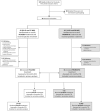Effects of Probiotic Supplementation on Gastrointestinal, Sensory and Core Symptoms in Autism Spectrum Disorders: A Randomized Controlled Trial
- PMID: 33101079
- PMCID: PMC7546872
- DOI: 10.3389/fpsyt.2020.550593
Effects of Probiotic Supplementation on Gastrointestinal, Sensory and Core Symptoms in Autism Spectrum Disorders: A Randomized Controlled Trial
Abstract
The microbiota-gut-brain axis has been recently recognized as a key modulator of neuropsychiatric health. In this framework, probiotics (recently named "psychobiotics") may modulate brain activity and function, possibly improving the behavioral profiles of children with Autism Spectrum Disorder (ASD). We evaluated the effects of probiotics on autism in a double-blind randomized, placebo-controlled trial of 85 preschoolers with ASD (mean age, 4.2 years; 84% boys). Participants were randomly assigned to probiotics (De Simone Formulation) (n=42) or placebo (n=43) for six months. Sixty-three (74%) children completed the trial. No differences between groups were detected on the primary outcome measure, the Total Autism Diagnostic Observation Schedule - Calibrated Severity Score (ADOS-CSS). An exploratory secondary analysis on subgroups of children with or without Gastrointestinal Symptoms (GI group, n= 30; NGI group, n=55) revealed in the NGI group treated with probiotics a significant decline in ADOS scores as compared to that in the placebo group, with a mean reduction of 0.81 in Total ADOS CSS and of 1.14 in Social-Affect ADOS CSS over six months. In the GI group treated with probiotics we found greater improvements in some GI symptoms, adaptive functioning, and sensory profiles than in the GI group treated with placebo. These results suggest potentially positive effects of probiotics on core autism symptoms in a subset of ASD children independent of the specific intermediation of the probiotic effect on GI symptoms. Further studies are warranted to replicate and extend these promising findings on a wider population with subsets of ASD patients which share targets of intervention on the microbiota-gut-brain axis.
Clinical trial registration: ClinicalTrials.gov, identifier NCT02708901.
Keywords: adaptive functioning; autism spectrum disorders; gastrointestinal symptoms; inflammatory biomarkers; microbiota-gut-brain axis; probiotics; sensory processing.
Copyright © 2020 Santocchi, Guiducci, Prosperi, Calderoni, Gaggini, Apicella, Tancredi, Billeci, Mastromarino, Grossi, Gastaldelli, Morales and Muratori.
Figures
References
-
- American Psychiatric Association Diagnostic and statistical manual of mental disorders. 5th ed Washington, DC: Am Psychiatric Publishing; (2013).
Associated data
LinkOut - more resources
Full Text Sources
Other Literature Sources
Medical


